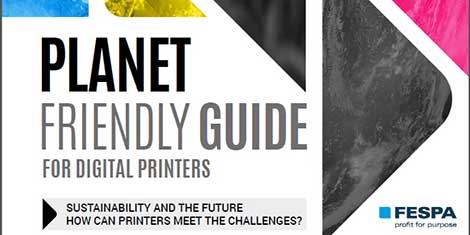
FESPA has re-launched its Planet Friendly Guide in a new format consisting of a series of ‘mini’ guides. Originally published in 2007 as a single document, the FESPA Planet Friendly Guide has now been reconfigured as one introductory guide and 10 subject-specific guides. The guides are available free of charge to members of FESPA’s 37 national associations.
The guides now target separate areas where digital and screen printing can be approached with sustainable measures. This recognises the need for information specific to a printer’s own print processes and business priorities making it easier for printers to access the information that matters to them.
In addition to the introductory guide entitled ‘Sustainability and the Future – How Can Printers Meet the Challenges? The 10 subject guides cover:
- Pollution for Screen Printers
- Pollution for Digital Printers
- Hazardous Substances for Screen Printers
- Emissions to Water for Screen Printers
- Emissions to Air for Screen and Digital Printers
- Waste for Screen Printers
- Waste for Digital Printers
- Paper and Other Substrates for Screen and Digital Printers
- Environmental Management Techniques for Screen Printers
- Energy for Screen and Digital Printers
Sean Holt, General Secretary for FESPA comments: “Legislation and best practice are continually evolving within our industry and of course the Planet Friendly guides must incorporate these changes. We’ve also taken the opportunity to change the style of the guides, making them more reader-friendly. Keeping up to date with legislation can be prohibitively time-consuming, particularly for SMEs. The more digestible and pragmatic format should encourage printers to focus on specific areas of their business where they can implement better environmental practices in a practical and effective way.”
The guides have been created with the expert help of Michel Caza and Paul Machin, two leading voices in the industry each possessing a wealth of knowledge and practical experience on all matters relating to optimising environmental performance.
The research and creation of the Planet Friendly Guides is funded through FESPA’s Profit for Purpose programme, which has already reinvested millions of Euros generated by FESPA’s global exhibitions in various projects around the world to support FESPA’s global print community.
Planet Friendly Guides form part of FESPA’s wider Planet Friendly programme, which incorporates environmental advice, best practice and case studies into the educational visitor programme at all FESPA’s global events.
The FESPA Planet Friendly Guides are currently available in English, but will be translated into French, Italian, German and Spanish at a later date.




